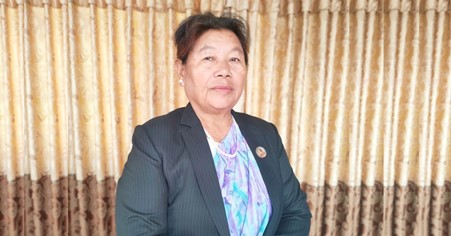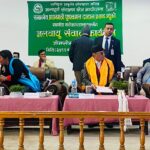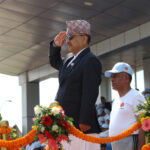Kathmandu, Oct 18:
It has been one and a half decades since Nepal transitioned to a republic system, marking the end of a 240-year monarchy. Despite the passage of time, the parliamentary practices and mindset within the country’s political sphere still appear to be rooted in traditional monarchical thinking. Adherence to these old practices is obviously hindering progress.
Durga Rai, a lawmaker representing the CPN (Maoist Centre) in the House of Representatives, believes that the ‘status quo’ continues to prevail in the parliament, impeding its smooth and effective functioning. She sees the need for reforms and the correction of shortcomings in parliamentary procedures. Principally, the operation of House business during a monarchy and in a federal democratic republic is vastly distinct and this should be reflected in the practices as well.
Rai advocates for a concerted effort to institutionalize the federal republic democracy, asserting that the House is often mired in unnecessary disputes and disruptions. She underlines the importance of the House supporting the government’s positive initiatives and providing warnings when necessary, although this collaborative approach seems to be lacking. Rai also notes that the allotted parliamentary hours for lawmakers to voice their opinions are not effectively utilized.
Lawmakers, Rai explains, bear a dual responsibility: they must fulfill their legislative duties while also serving as the voices of the people. However, the parliament members should primarily focus on legislative roles and responsibilities. While their role is vital in introducing effective bills, they should also be attentive to the development needs and concerns of the people.
Rai further observes challenges in implementing federalism within the country, as parties in the federal parliament hold differing views on the matter. Some political factions are resistant to the idea of federalism. Rai acknowledges the complexities involved in the transition but remains confident that the nation will not revert to the old system, as regression will not lead to the destination. “The implementation of federalism will continue to progress, ensuring a more inclusive and democratic future for Nepal.”
Parliamentarian Rai opined that there was a tendency to obstruct the implementation of the federalism. “The parties representing the parliament have also differing understanding about federalism. There is also a party in the Parliament which does not want implementation of federalism,” she said, adding, “We have complications in terms of enforcing federalism but there’s no turning back to the country. Federalism would be fully brought into effect.”
Rai, who represents CPN (Maoist Centre), emphasized completion of remaining works of peace process at the earliest. She viewed that it was a weakness on the part of the erstwhile government for not reaching any conclusions regarding the peace process since the signing of Comprehensive Peace Accord (CPA_.).
“A decade and half has elapsed since the CPA but the peace process related works still remain to be carried out completely. The erstwhile government ought to deliver on the transitional justice related issues. The incumbent government is holding discussions with all political parties to take the remaining works of peace process to a conclusion,” Rai shared.
The Bill related to transitional justice is under process. Both the government and the parliament should take the remaining works of peace process to a conclusion, according to her.
Rai, who forayed into politics since 2035 BS, is currently the central member of the CPN (Maoist Centre). She opined that the country would move forward on the path of sustainable peace only once the peace process is completed once for and all.
She viewed that the politicians should rise above the partisan interests and both the government and parliament should be responsible to complete the remaining work of the peace process so as to usher the country on the path of sustainable peace. “The first task of the current parliament should be completing the remaining works of the peace proceed,” she observed.
According to her, it would be too late for the country to attain prosperity if peace process is stalled or quelled due to vested interest.
On the occasion, the sexagenarian lawmaker extended best wishes to all Nepalis at home and abroad on the occasion of ongoing ten-day festivity -Dashain- and upcoming festivals Tihar, Chhat, Udhauli and Lhosar among other national festivals.
“May these national festivals inspire one and all to work in the best interest of the country and countrymen as well as to take forward the country on the path of sustainable peace,” she wished.
Ashok Ghimire/RSS




